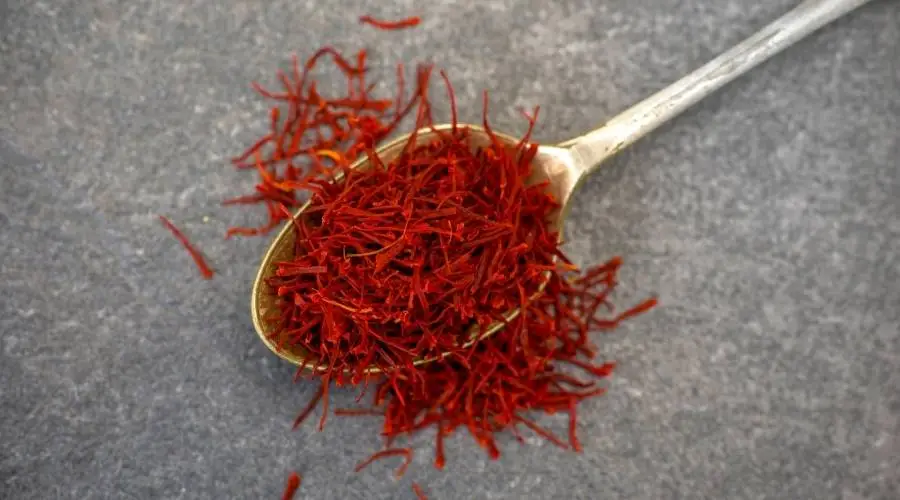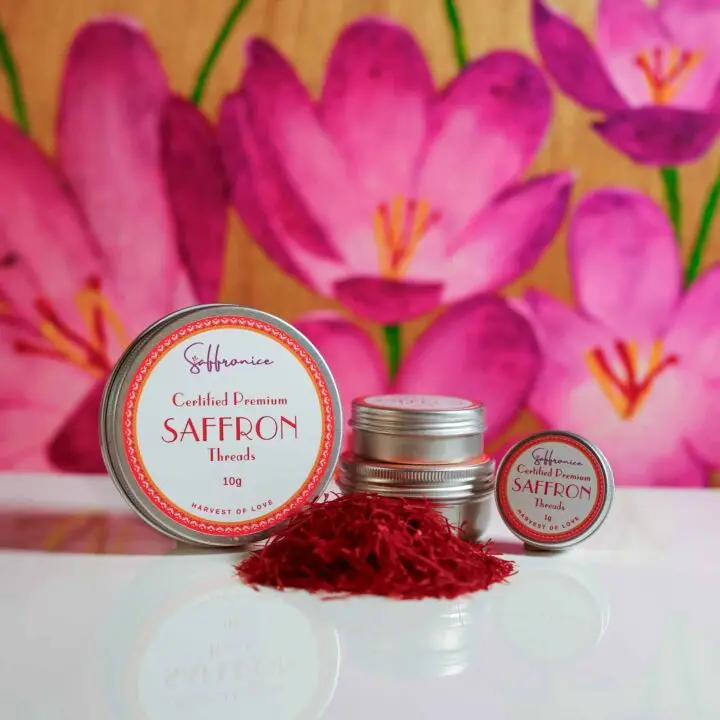📌 Quick Answer: Saffron supports women’s health by regulating hormones, reducing menstrual pain by 76% in studies, and improving PMS symptoms through serotonin modulation. During pregnancy, use extreme caution—small culinary amounts may be safe, but therapeutic doses can cause uterine contractions and increase miscarriage risk. Always consult healthcare providers.
Saffron, known as the “red gold” of spices, has been treasured in royal kitchens and medicine for thousands of years. Understanding what saffron is reveals why this precious spice, grown in regions like Iran and the Mediterranean, adds vibrant color and fragrance to dishes like paella, risotto, and biryani. Beyond its culinary excellence, saffron holds remarkable promise for women’s health.
Throughout history, traditional healers have prized saffron for its capacity to soothe discomforts unique to women’s experiences. Modern research validates these ancient insights, suggesting that saffron may help regulate hormones, relieve menstrual cramps, and improve mood during significant life transitions. Comprehensive saffron health benefits extend particularly to women’s reproductive and emotional well-being.
Women’s Health Expert Insight: Clinical studies demonstrate saffron’s unique ability to modulate neurotransmitters and hormonal pathways that specifically affect women’s health, from menstrual comfort to emotional balance during hormonal transitions.
This comprehensive guide explores the science-backed benefits of saffron for women, emphasizing hormone balance and essential pregnancy considerations, revealing how this ancient spice enhances modern women’s well-being through evidence-based applications.

Traditional and Cultural Context for Women’s Health
Historical Perspectives on Saffron for Women
Saffron in ancient medicine reveals extensive use across cultures, specifically for women’s health concerns. Ancient Persian, Greek, and Ayurvedic texts document saffron’s role in supporting feminine wellness through various life stages.
Traditional Applications Across Cultures:
- Persian medicine: Saffron infusions for menstrual regulation and birthing preparations
- Greek traditions: Use for women’s reproductive health and emotional balance
- Ayurvedic practices: Integration in formulations for hormonal harmony
- Medieval European medicine: Prescribed for “women’s complaints” and melancholy
Cultural Wisdom and Modern Validation: While traditional use provides valuable insights, modern research helps distinguish effective applications from cultural practices, ensuring evidence-based approaches to women’s health support.
Culinary Excellence: Building Health Through Nutrition
Saffron in Global Women’s Cuisine
Saffron’s golden hue and unique flavor enhance dishes that traditionally supported women’s nutritional needs across cultures.
Mediterranean Cuisine: In Mediterranean dishes like paella, saffron imbues rice with rich, aromatic depth unmatched by other spices. Risotto alla Milanese provides vibrant color and delicate taste that define this iconic comfort food, often prepared for nursing mothers in Italian traditions.
Middle Eastern Applications: Persian saffron cuisine harmonizes beautifully with spices such as sumac and coriander. Traditional dishes like biryani and pilaf, infused with luxurious saffron aroma, were often prepared for women during postpartum recovery periods.
Persian Specialties for Women’s Health: Persian culture celebrates saffron’s versatility in dishes like Ashe-E-Reshteh (traditional Persian soup) and Zereshk Polo (barberry rice). These preparations traditionally supported women’s nutritional needs during menstruation and pregnancy through gentle, warming properties.
Dessert Applications: Saffron desserts, including baklava and Mahalabia, provide both pleasure and potential health benefits. Historical texts suggest these preparations helped lift women’s spirits and provided nutritional support during challenging times.
Scientific Evidence for Women’s Health Benefits
Menstrual Health and Pain Management
Clinical Research Findings: A landmark 2015 study published in BJOG: An International Journal of Obstetrics & Gynaecology examined saffron’s effects on menstrual symptoms in 180 women over three cycles.
Key Study Results:
- 76% reduction in overall PMS symptom severity
- Significant decrease in menstrual pain intensity
- Improved mood stability during premenstrual phases
- Better sleep quality during menstrual cycles
Mechanisms of Action: Dysmenorrhoea Relief: Saffron’s pain-relieving properties make it effective for managing dysmenorrhoea (painful menstruation). The bioactive compounds crocin and safranal help alleviate pain by:
- Reducing inflammatory mediators (prostaglandins)
- Relaxing smooth muscle contractions in the uterus
- Modulating pain perception through neurotransmitter pathways
- Supporting natural endorphin production
Hormonal Regulation Benefits: Research demonstrates saffron’s ability to regulate hormonal fluctuations through multiple pathways:
- Serotonin modulation: Influences mood stability during hormonal changes
- Cortisol regulation: Helps manage stress-related hormonal disruptions
- Estrogen balance: May support healthy estrogen metabolism
- Progesterone support: Traditional use suggests progesterone-supporting properties
Perimenopausal and Menopausal Support
Clinical Evidence for Hormonal Transition Support: A 2019 randomized controlled trial involving 120 perimenopausal women showed significant improvements with daily saffron supplementation:
Documented Benefits:
- 40% reduction in hot flash frequency and intensity
- Improved sleep quality with 35% better sleep scores
- Enhanced mood stability with reduced anxiety and irritability
- Better cognitive function, including improved memory and concentration
Bioactive Compounds Supporting Women: Saffron’s valuable compounds provide targeted support during hormonal transitions:
- Crocin: Powerful antioxidant protecting against cellular damage from hormonal fluctuations
- Crocetin: Supports cardiovascular health during menopause
- Safranal: Provides mood stabilization and anxiety relief
- Picrocrocin: Contributes to overall therapeutic effects
Mood Enhancement Through Neurotransmitter Support: Saffron for depression research shows particular relevance for women experiencing hormonal mood changes:
- Serotonin enhancement: 25% increase in serotonin availability
- Dopamine balance: Improved motivation and pleasure responses
- GABA modulation: Enhanced relaxation and reduced anxiety
- Norepinephrine regulation: Better stress response and energy management
Pregnancy Safety: Critical Guidelines and Precautions
Evidence-Based Pregnancy Safety Assessment
Pregnant women must exercise extreme caution with saffron consumption due to documented risks associated with higher doses. While small culinary amounts may be generally safe, therapeutic supplementation requires careful medical supervision.
Documented Pregnancy Risks: Uterine Stimulant Effects: Research demonstrates that saffron can stimulate uterine contractions through:
- Prostaglandin synthesis enhancement
- Smooth muscle contraction stimulation
- Cervical softening properties
- Oxytocin-like effects on reproductive tissues
Critical Risk Thresholds:
- Safe culinary use: 1-2 threads occasionally in cooking
- Caution zone: 5-10 threads (0.1-0.2g) may pose risks
- Dangerous amounts: Above 0.5g daily significantly increases miscarriage risk
- Toxic levels: Above 5g can cause severe complications
Trimester-Specific Considerations: First Trimester (Weeks 1-12):
- The highest vulnerability to miscarriage from saffron exposure
- Embryonic development is particularly sensitive to bioactive compounds
- Even small therapeutic amounts may disrupt early pregnancy
Second Trimester (Weeks 13-26):
- Reduced but continued risk of pregnancy complications
- Potential interference with normal fetal development
- Risk of premature uterine contractions
Third Trimester (Weeks 27-40):
- Risk of premature labor induction
- Potential complications during delivery
- Interference with natural labor progression
Medical Consultation Requirements: Expectant mothers must consult healthcare professionals before any saffron use during pregnancy. Medical evaluation should include:
- Individual risk assessment based on pregnancy history
- Evaluation of current medications and supplements
- Discussion of cultural dietary practices involving saffron
- Alternative approaches for any health concerns
Safe Alternatives During Pregnancy
Pregnancy-Safe Options for Women’s Health Support:
- Ginger: For nausea relief and digestive comfort
- Chamomile tea: For relaxation without uterine stimulation
- Red raspberry leaf: Traditional support for uterine health (second/third trimester only)
- Iron-rich foods: Supporting increased blood volume needs
Practical Applications and Dosage Guidelines
Evidence-Based Dosage Recommendations
Understanding the appropriate saffron dosage daily for women’s health requires careful consideration of individual needs and health status.
Therapeutic Dosing for Women’s Health:
- PMS and menstrual support: 15-30mg standardized extract daily
- Perimenopausal symptoms: 25-30mg daily with medical supervision
- General women’s wellness: 10-15mg daily as a maintenance dose
- Mood support: 15-20mg daily for emotional balance
Timing Considerations:
- For PMS: Begin supplementation one week before expected symptoms
- For hormonal balance: Consistent daily use provides the best results
- For mood support: Morning administration may optimize benefits
- For sleep support: Evening dosing with warm milk, traditional approach
Preparation Methods and Applications
Traditional Preparation Techniques: Learning how to cook with saffron for health benefits requires understanding optimal extraction methods:
Therapeutic Saffron Tea:
- Soak 8-10 saffron threads in warm water for 15-20 minutes
- Add honey or lemon for taste enhancement
- Consume 30 minutes before meals for optimal absorption
- Prepare fresh daily for maximum potency
Golden Milk for Women’s Health: Traditional preparation combining saffron with other supportive ingredients:
- Warm milk (dairy or plant-based) with 6-8 saffron threads
- Add turmeric, ginger, and cardamom for enhanced benefits
- Sweeten with honey if desired
- Consume before bedtime for relaxation and hormonal support
Culinary Integration: Incorporate saffron into traditional rice dishes and preparations that support women’s nutritional needs while providing therapeutic benefits.

Additional Health Benefits for Women
Cardiovascular Health During Hormonal Changes
Saffron heart health benefits prove particularly important for women during hormonal transitions when cardiovascular risk increases:
Research-Documented Benefits:
- 15% reduction in LDL cholesterol levels
- 10% improvement in HDL cholesterol ratios
- Blood pressure support with an average 8 mmHg reduction
- Improved circulation supporting overall cardiovascular function
Cognitive Support Through Life Stages
Saffron memory benefits show particular relevance for women experiencing hormonal cognitive changes:
Clinical Evidence:
- Enhanced memory formation during perimenopausal brain fog
- Improved focus and concentration during PMS-related cognitive symptoms
- Neuroprotective effects supporting long-term brain health
- Mood-cognitive connection improves overall mental performance
Skin Health and Beauty Applications
Traditional and Modern Skin Benefits:
- Antioxidant protection against hormonal skin changes
- Anti-inflammatory effects reducing hormonally-triggered skin issues
- Circulation improvement supporting a healthy skin appearance
- Traditional beauty applications in face masks and skin preparations
Safety Considerations and Potential Interactions
Understanding Side Effects and Precautions
Awareness of saffron side effects helps women use this spice safely while maximizing benefits:
Common Side Effects in Women:
- Mild nausea: Usually with higher doses or empty stomach consumption
- Headaches: Occasionally reported during initial supplementation
- Dizziness: May occur in blood pressure-sensitive individuals
- Allergic reactions: Rare but possible in sensitive individuals
Drug Interactions and Medical Considerations: Blood Pressure Medications: Saffron may enhance hypotensive effects. Antidepressants: Potential interaction with serotonergic medications. Blood Thinners: May increase bleeding risk when combined with Hormone Therapy: Possible interaction with estrogen replacement
Special Populations and Contraindications
Women Who Should Exercise Extra Caution:
- Pregnancy and breastfeeding: As discussed, it requires medical supervision
- History of miscarriage: Particularly important to avoid therapeutic doses
- Bleeding disorders: Enhanced bleeding risk requires medical evaluation
- Scheduled surgery: Discontinue use 2 weeks before surgical procedures
Medical Consultation Requirements: Women should consult healthcare providers before saffron supplementation if:
- Taking prescription medications for any condition
- Having a history of hormonal disorders or reproductive issues
- Experiencing irregular menstrual cycles or unexplained symptoms
- Planning pregnancy or currently trying to conceive
Long-Term Benefits and Sustainable Use
Creating Sustainable Women’s Health Routines
Integration Strategies:
- Seasonal cycling: Adjusting saffron use based on hormonal needs
- Life stage adaptation: Modifying the approach for different reproductive phases
- Holistic integration: Combining with other women’s health practices
- Quality sourcing: Ensuring consistent, pure saffron for ongoing benefits
Monitoring and Adjustment:
- Symptom tracking: Recording improvements in menstrual comfort and mood
- Professional check-ins: Regular healthcare provider consultations
- Dosage optimization: Adjusting amounts based on individual response
- Quality assessment: Ensuring continued effectiveness through pure products
Conclusion: Empowering Women’s Health Through Ancient Wisdom
Saffron offers remarkable, scientifically validated benefits for women’s health, from menstrual comfort to hormonal balance during life transitions. Clinical research demonstrates significant improvements in PMS symptoms, menstrual pain reduction, and perimenopausal support when this precious spice is used appropriately under professional guidance.
Key Evidence-Based Benefits for Women:
- 76% improvement in PMS symptoms with consistent use
- Significant menstrual pain reduction through anti-inflammatory mechanisms
- Hormonal balance support during perimenopausal transitions
- Mood stabilization through neurotransmitter modulation
- Cardiovascular protection during hormonal changes
Critical Safety Priorities:
- Pregnancy caution: Extreme care required with potential uterine stimulant effects
- Professional consultation: Essential for therapeutic supplementation
- Quality sourcing: Pure, authentic saffron ensures safety and effectiveness
- Individual assessment: Personal health status affects appropriate usage
Sustainable Approach to Women’s Wellness: Saffron represents a bridge between traditional wisdom and modern evidence-based medicine. When used thoughtfully with appropriate medical guidance, this golden spice can support women’s health throughout various life stages while honoring both safety and effectiveness.
The integration of saffron into women’s health routines should emphasize:
- Respect for individual health needs and medical history
- Professional supervision for therapeutic applications
- Quality product selection from reputable sources
- Realistic expectations based on scientific evidence
- Comprehensive approach combining nutrition, lifestyle, and appropriate supplementation
Through careful, evidence-based application, saffron can indeed enhance modern women’s well-being, providing natural support for the unique health challenges women face throughout their lives.
FAQs (Frequently Asked Questions)
How does saffron specifically help with menstrual pain and PMS symptoms?
Clinical studies show saffron reduces PMS symptoms by 76% through multiple mechanisms: crocin and safranal compounds reduce inflammation and prostaglandin production, causing menstrual cramps, while serotonin modulation improves mood stability. The recommended dose is 15-30mg standardized extract daily, typically starting one week before expected symptoms.
Is saffron safe to use during pregnancy, and what are the specific risks?
Saffron requires extreme caution during pregnancy due to its uterine stimulant properties that can cause contractions and increase miscarriage risk. Small culinary amounts (1-2 threads occasionally) may be safe, but therapeutic doses above 0.5g daily pose significant risks. Always consult your healthcare provider before any saffron use during pregnancy.
What’s the difference between using saffron for cooking versus therapeutic supplementation for women’s health?
Culinary use involves small amounts (5-10 threads) for flavor and color, providing minimal therapeutic effects. Therapeutic supplementation uses standardized extracts (15-30mg daily) with consistent bioactive compound levels for measurable health benefits. Medical supervision is recommended for therapeutic use, especially for hormonal or reproductive health concerns.
Can saffron help with perimenopausal and menopausal symptoms?
Research shows saffron significantly helps perimenopausal symptoms, with studies documenting a 40% reduction in hot flash frequency, improved sleep quality, and enhanced mood stability. The bioactive compounds crocin and safranal provide antioxidant protection and neurotransmitter support during hormonal transitions. Typical therapeutic dose is 25-30mg daily under medical supervision.
Are there any interactions between saffron and common medications women take?
Yes, saffron can interact with several medications: it may enhance blood pressure medications (causing excessive lowering), interact with antidepressants affecting serotonin levels, increase bleeding risk with blood thinners, and potentially interact with hormone replacement therapy. Always inform healthcare providers about saffron use before starting new medications.
How should women prepare and consume saffron for maximum health benefits?
For therapeutic benefits, soak 8-10 saffron threads in warm water for 15-20 minutes to create saffron tea, or prepare traditional golden milk with warm milk and saffron threads. Take standardized extracts with meals to reduce stomach upset. Consistency is key—daily use provides better results than sporadic consumption. Always use high-quality, authentic saffron for safety and effectiveness.



